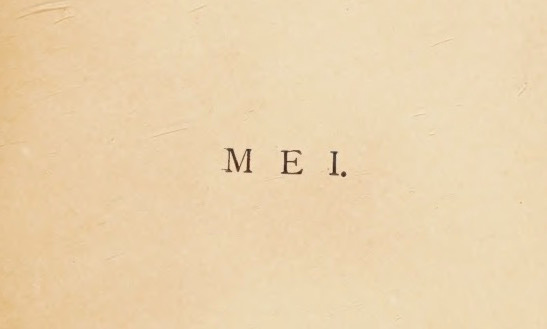April/May 2025: Some proper reading (for once!)
Plus 'Mei', the slechtvalk and . . . Meat Puppets.
Hot on the heels of my long-delayed previous post, here’s a collection of odds and sods for your reading, listening and viewing pleasure.
U.S.S.R. • I don’t know what my problem was, exactly, but April started out pretty grim, from a reading perspective. Perhaps it was the aftermath of my fifty-third birthday, which didn’t go well on either of the days I attempted to celebrate it. Or maybe it was just the various creaks and moans that seem to accompany me wherever I go during the first half of spring in northern Europe: the pollen that’s always trying to get into my face, the cold rain, the false hopes, etc.
But as I soon discovered, the only way to cure this particular bout of self-pity was to Unleash Some Serious Reacher. Thankfully, a kindly stranger on the Internet, who left no name—not even a call-sign—deposited a whole stack of very well-used Jack Reacher e-books in a place where I could freely access them, if you get my meaning. And that’s all I have to say on the matter, expect to mention that reading ten Jack Reacher novels in a row is not advised.
In fact, I believe, the technical term is ‘contraindicated’.
D.E.A.R. • Having flushed Jack Reacher out of my system, if not down the e-toilet, in May I turned at last to some proper literature. In a nutshell, dear subscribers, I re-learnt the eternal maxim, or koan, that has nourished us since the invention of the book: Drop Everythang And Read. With a greater emphasis on read than everythang, of course. While I have not yet hit the dizzying heights of my efforts last summer, there’s always time for more. I mean, it’s not like we’ll ever run out of books. Riiiight?
And here, without further adieux (oh la lol), are the early results.
The Sentence (Louise Erdrich): A creative, funny, moving and human response to the Black Lives Matter movement in the United States—and, obliquely, the Covid-19 pandemic—written from the literal eye of that heartbreaking storm, Minneapolis. More specifically, The Sentence is a hyper-real examination of what happens to First Nations people under late capitalism. Its narrator, an ex-con Ojibwe woman named Tookie (who reminds me, just a little, of Peter Høeg’s Smilla), works in a bookshop which, despite this being a work of fiction, is actually run by the author, Louise Erdrich. The book follows Tookie’s life over the course of a year during which Covid-19, the murder of George Floyd by Minneapolis police, and subsequent protests, rock the city. As a subplot, the bookshop is haunted by a former customer whose life story illustrates the complexity of Indigenous concepts of belonging. I absolutely loved it. The Sentence is also one of only a few books I’ve ever read to include a comprehensive reading list, for which act of generosity alone it deserves millions of readers.
The Beginner’s Goodbye (Anne Tyler): Can I just ask again: what I have been doing my whole life without Anne Tyler’s writing in it? The Beginner’s Goodbye ostensibly belongs to that non-genre of slim volumes, the meagre physicality of which often make me nervous when I pick them up (Is this one going to nourish me sufficiently? Have some of its pages actually fallen out?). Another novel dealing in ghosts, The Beginner’s Goodbye tells the story of Aaron and Dorothy, a couple who never really got along but whose marriage is abruptly cancelled when a tree falls on their house, killing Dorothy. Aaron tries to get on with his life but keeps seeing Dorothy in public places, and is also highly annoyed by various peoples’ attempts to set him up with someone new. This makes the plot sound trite but it’s far from that, with Tyler rendering Aaron’s narrative voice masterfully. Extra bonus points for the fact that Aaron works as an editor (full-time, note) at a vanity publisher specialising in autobiographies by middle-aged men and self-help guides with titles like The Beginner’s Guide to Cancer. It’s just so beautifully sad and uplifting at the same time, with its central message about living the life in front of you, so simple and yet so eloquently expressed.
Long Island (Colm Tóibín): I hate back-cover testimonials with a passion, so it’s just as well I didn’t spot the one describing this book as Tóibín’s ‘masterpiece’ until after I’d finished it. Perhaps even more problematically for me, it wasn’t until I’d finished Long Island that I realised it’s actually the sequel to another novel, Brooklyn. K— and I just had a spirited debate about whether we should seek out and read Brooklyn, or whether it even matters. What a strangely unsatisfying, seemingly abject book Long Island is, filled with characters whose motives are illogical, if not outright baffling, and dialogue that lacks affect, in the manner of Claire Keegan’s bleak short stories, as if designed to be read aloud by Cillian Murphy in a grim monotone signifying ‘robo-Irish’. At the same time, what a world Tóibín creates: one in which Long Island itself barely plays a cameo role, where men and women deceive and betray each other but remain together; where a cast of minor characters pronounces judgement at will; where town squares and windswept beaches become desperate, unitary environments; and where the narrative rushes towards its inexorable conclusion like “A Day In the Life”: tragic, pathetic, bleak, farcical. Now that’s a testimonial I’d like to see.
Jott (Sam Thompson): An epigraph from Samuel Beckett telegraphs, in a straightforward way, the kind of novel to expect in Jott. In some respects it’s a homage to Beckett’s prose fiction but in others it resembles a study of 1930s psycho-therapeutic techniques. Told from the perspective of a young Irish doctor working in an institution for the ‘curably’ insane, Jott is a novel within a novel, as written by the doctor’s best friend, also Irish although not a doctor (and possibly dealing with a few mental health issues of his own). But this is not a self-indulgently clever book: instead, the prose is thick with imagery suiting the decade in which it is set: everything’s slightly dark even during daytime hours, shades of green and brown dominate and there’s lots of walking under trees (in silence), journeys on clunking public transport and bad weather. Initially I found it a bit of a slog but Thompson’s writing is so stylish that eventually I succumbed to its charms. Something about the self-consciousness of the allusions to Beckett (and Joyce), perhaps. Oh and here’s a little bit of hindsight, too: I just learnt that the two Irish characters are based on the author’s grandfather and . . . Samuel Beckett. So, there you go. I swear I didn’t know that when I read the book. And it doesn’t really matter. Although I guess I’ve now spoiled the surprise for anyone who reads this review. Is . . . anybody . . . reading this . . . at all?
Wrote For Luck (D.J. Taylor): I borrowed this collection of stories from the library based purely on its title, which I hoped was a reference to the Happy Mondays song of the same name (usually referred to as ‘W.F.L.’, Paul Oakenfold’s ‘Think About the Future Mix’ of which is, in my humble opinion, the absolute pinnacle of late-1980s Madchester ‘culture’). Alas. If only I’d bothered to read the testimonial on the cover by Hilary Mantel, I would have quickly sussed out that D.J. Taylor’s stories are about as far from Madchester as it’s possible to be while still standing in the British Isles. And even one second of Internet searching would have alerted me to the fact that in 2019 Faber & Faber (LOL!) released a collection of Happy Mondays’ lead singer Shaun Ryder’s lyrics, also under the title Wrote For Luck. Which is kind of twisting my melon, man, just thinking about it. D.J. Taylor’s collection may not feature gurning, maracas or smoke machines, but at its best it does an okay line in a kind of 1980s middle-class professional scene you’d expect Helen Mirren to nail. At its worst, it’s just insufferably middle-class. And Helen Mirren—unlike a whole bunch of other English ‘personalities’, including David Cameron, for Gawd’s sake—is not mentioned. Interestingly, in one story, a character attributes the phrase ‘wrote for luck’ to Samuel Beckett but this is likely to be incorrect. Like my hot-take on middle-class English professionals, perhaps. Take it away, Paul . . .
‘MAY.BE.’ • In 1889 the Dutch poet Herman Gorter published a 4,381-line poem, entitled ‘Mei’ [May], which is now regarded [insert Wikipedia superscript query: by whom?] as an Impressionist classic in the Netherlands.
On learning of the poem’s existence a few years ago I toyed with the idea of translating it into English, although of course that’s already been done several times over. But, it now being May once again, I thought I’d have a crack at my own personal rendition of the poem’s opening lines.
You can view a scan of the original on the Internet Archive.
'May.be' I. Een nieuwe lente en een nieuw geluid . . . --Herman Gorter, 'Mei' when spring sounds brand-new it makes novels feel old to write a poem that mimics a day, or a season’s whistle (that we heard on the building site, some summer night in a crumbling city, its canals long gone or covered over if we ever really lived in such a place (yes, dark and still despite the golden hour (the children outside playing in the cold, late light and the vistas of barns and meadows the jigsaw puzzles of old village houses through a glass I’d hear it once again: the old kibbeling truck’s melody or the horrible hack of a neighbour clearing his throat when they brought us happy cherries home from school and spring’s wet rains pushed the blue door wide open while little boys wandered the lanes, urinated on a wall playing with water pistols or searching for salamanders and we listened for blackbirds and wrens on some app if only to calm ourselves down before nestling into bed while faraway the slechtvalk called out my name in vain and suddenly there was no time to read stories (yet again it’s just a moment, as when you reach to close a window for him, already asleep: his whistling snore a flute, a reed. -- Wânswert, 22 May 2025
(VROEGE) VOGELS • When I started this newsletter, I planned to share my impressions of village life in Fryslân. While that hasn’t yet really eventuated, you can now get a little taste of life in Wânswert by watching this episode of Vroege Vogels, a Dutch television programme about birdwatching. Our village is featured because a slechtvalk (peregrine falcon) lives in the old church belltower.
As falcons are extremely rare in this part of the world (which is dominated by migratory geese, swans, sparrows, wrens and other common-or-garden birds), Wânswert has become a bit of a magnet for twitchers, who sometimes ask if they can search our garden for feathers, and occasionally bunk down in the church overnight to get a chance to see the slechtvalk.
The video (only in Dutch, unfortunately) also gives an overview of the landscape in this corner of Fryslân, which is part of the Wadden Sea UNESCO world heritage area.
(DESERT) SOUNDS • Finally, some old, rediscovered tunes. The first time I paid any attention to Meat Puppets, a three-piece cowpunk band that emerged from the Arizona desert haze in the early 1980s, was when Kurt Cobain got founding members (and brothers) Curt and Kris Kirkwood up on stage during Nirvana’s 1993 MTV Unplugged performance to play three songs off the band’s second—and undoubtedly best—album, 1984’s Meat Puppets II.
But recently I came across a 1985 video clip of the band performing ‘Swimming Ground’ and did a massive double-take. They were appearing live on a local Phoenix television station, complete with an audience of young folks wearing plaid shirts and jeans in that mid-1980s way, copies of the latest S.E. Hinton novel—or maybe Z For Zachariah—in their back pockets, down in the city for the studio recording and then dispersing, in the eternal afternoon sun, to suburbs of rust and cactus green.
‘Swimming Ground’ is so great. In fact, it’s a shimmering, tossed-off summertime classic for people who don’t actually swim, Curt Kirkwood’s neo-Ramones monotonal twang disguising the lyrics’ innocent adolescent joy, his guitar licks effortlessly travelling through time to pattern-match 21st-century Sahel-sound bands like Etran De L'Aïr. It’s as boppy as R.E.M.’s ‘Radio Free Europe’ or ‘Gardening At Night’ and yet more immediate than anything Berry, Buck, Mills and Stipe ever produced.
As ever, if there’s a specific topic you’d like me to cover in a future post, or a thought you’d like to share, please feel free to leave a comment (if you’re reading on Substack), reply directly to this message (if you’re receiving the newsletter via email) or else contact me the old-fashioned way at davey@daveydreamnation.com.
Oh, and if you enjoy my writing and would like to support me with a donation, however large or small, you can now buy me a coffee through Ko-Fi! Just click on the bright orange button below and make mine a flat white!
All the best and bye for now,
Davey





David, I really enjoyed your rendition of 'Mei' - and it meid (har har) me want to read your translation of the original (if not the original itself, one day).
Now that I live in the NL, I've been entranced by the springtime - just how green everything is. I recently read Karen Blixen's story 'The Poet'. She captures so beautifully what Norther European springtime feels like. You may enjoy, or find some inspiration there.
Would love to read more about Frisian life!